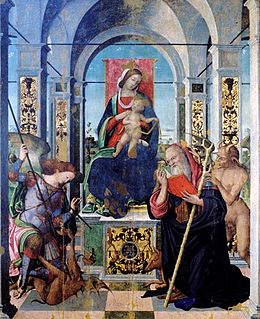 W
WAntonio Aleotti was an Italian painter, first mentioned in records in 1494 and active in Ferrara. Born in Argenta, he is also known as Antonio dell'Argento. He painted frescoes in the Chiesa della Morte in Ferrara.
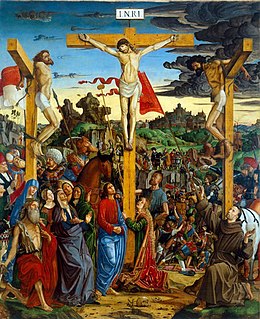 W
WFrancesco Bianchi was an Italian painter of the Renaissance period. He is also known as Francesco del Bianchi Ferrara and Il Frare. He was born at Ferrara. Modena is also mentioned as the place of his birth. His works were much esteemed in his time. He was a pupil of Cosimo Tura. He is said to have been an instructor of Correggio, but Bianchi would have died when the former was only 16 years old.
 W
WBoccaccio Boccaccino was a painter of the early Italian Renaissance, belonging to the Emilian school. He is profiled in Vasari's Le Vite delle più eccellenti pittori, scultori, ed architettori.
 W
WCristoforo da Bologna was an Italian painter. He was active in Bologna, Modena, and Ferrara. He painted toward the close of the 14th and the beginning of the 15th century.
 W
WGiuseppe Bonati was an Italian painter of the Baroque period, active in Rome and Ferrara.
 W
WGabriele Cappellini was an Italian painter of the Renaissance. He was also called il Caligarino or il Calzolaretto, from his having first pursued that trade. He was born in Ferrara, and there trained under Dosso Dossi, he was active c. 1520. For the church of San Francesco, Ferrara he painted a St. Peter and St. James and for San Giovannino the principal altar-piece, representing The Virgin and Infant with several Saints.
 W
WBaldassare Carrari or Baldassarre Carrari il Giovane was an Italian painter of the Renaissance period, active in both his native Forlì and Ravenna from 1486 till his death in his town of birth. He was a pupil of the painter Niccoló Rondinelli.
 W
WFrancesco Costanzo Cattaneo was an Italian painter of the Baroque period, born and mainly active in Ferrara. He is also known as Costanzo or Costanza Cattanio.
 W
WAntonio Cicognara, was a 15th-century Italian painter.
 W
WBenedetto Coda was an Italian painter of the Renaissance active in Rimini. He is mainly known for his religious subjects.
 W
WMichele Coltellini (1480–1542) was an Italian painter, active mainly in Ferrara.
 W
WFrancesco del Cossa was an Italian Renaissance painter of the School of Ferrara.
 W
WLorenzo Costa was an Italian painter of the Renaissance.
 W
WTaddeo Crivelli, also known as Taddeo da Ferrara, was an Italian painter of illuminated manuscripts. He is considered one of the foremost 15th-century illuminators of the Ferrara school, and also has the distinction of being the probable engraver of the first book illustrated with maps, which was also the first book using engraving.
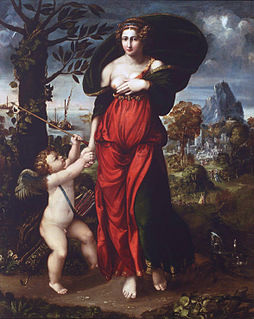 W
WBattista Dossi, also known as Battista de Luteri, was an Italian painter who belonged to the Ferrara School of Painting. He spent nearly his entire career in service of the Court of Ferrara, where he worked with his older brother Dosso Dossi. It is believed that Battista worked in the Rome studio of Raphael from 1517 to 1520. Battista’s students include Camillo Filippi.
 W
WDosso Dossi was an Italian Renaissance painter who belonged to the School of Ferrara, painting in a style mainly influenced by Venetian painting, in particular Giorgione and early Titian.
 W
WAdriana Bisi Fabbri (1881–1918) was an Italian painter.
 W
WBono da Ferrara or Bono Ferrarese was an Italian painter of the early-Renaissance period.
 W
WStefano da Ferrara was an Italian painter from Ferrara who active in the latter half of the 15th century.
 W
WVicino da Ferrara (1432–1509) was an Italian painter of the 15th-16th century. He is suspected to be identical to Baldassare d'Este from Reggio Emilia, also known as Baldassare da Reggio.
 W
WFrancesco Ferrari (1634–1708) was an Italian painter and architect of the Baroque period, active in Ferrara and across Northern Italy and Vienna.
 W
WCamillo Filippi was an Italian painter who flourished about the middle of the 16th century.
 W
WGirolamo Da Carpi was an Italian painter and decorator who worked at the Court of the House of Este in Ferrara. He began painting in Ferrara, by report apprenticing to Benvenuto Tisi ; but by age 20, he had moved to Bologna, and is considered a figure of Early Renaissance painting of the local Bolognese School.
 W
WGiovanni Francesco Maineri or Gianfrancesco de' Maineri was an Italian painter of the Renaissance, active in Ferrara.
 W
WGiuseppe Mazzuoli was an Italian painter of the Mannerist period, active mainly in the court of Alfonso II d'Este of Ferrara.
 W
WGiuseppe Mentessi was an Italian painter.
 W
WFrancesco Naselli was an Italian painter of the Baroque period.
 W
WOrtolano was an Italian painter of the Ferrara School, active in the Renaissance period. Ticozzi cites his birth as ca. 1480.
 W
WDomenico Panetti (1460–1530) was an Italian painter of the Renaissance period, active mainly in his native Ferrara. Among his early pupils was Garofalo. He painted a Deposition from the Cross for the church of San Niccolo and a Visitation for San Francesco in Ferrara.
 W
WGiacomo Parolini was an Italian painter of the Baroque period, mainly active in Ferrara.
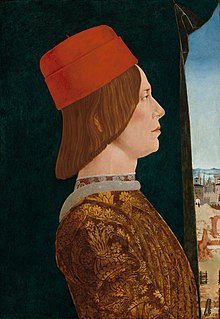 W
WErcole de' Roberti, also known as Ercole Ferrarese or Ercole da Ferrara, was an Italian artist of the Early Renaissance and the School of Ferrara. He was profiled in Vasari's Le Vite delle più eccellenti pittori, scultori, ed architettori. The son of the doorkeeper at the Este castle, Ercole later held the position of court artist for the Este family in Ferrara. According to Vasari:Ercole had an extraordinary love of wine, and his frequent drunkenness did much to shorten his life, which he had enjoyed without any accident up to the age of forty, when he was smitten one day by apoplexy, which made an end of him in a short time.
 W
WNiccolò Roselli was an Italian painter of the Renaissance period.
 W
WScarsellino or Ippolito Scarsella was an Italian mid-to-late sixteenth century reformist painter and one of the most important representatives of the School of Ferrara. His landscapes of both sacred and secular themes strongly anticipate the landscape painting traditions of the 17th century.
 W
WGiovanni Francesco Surchi was an Italian painter of the late-Renaissance period, active in Ferrara.
 W
WBenvenuto Tisi was a Late-Renaissance-Mannerist Italian painter of the School of Ferrara. Garofalo's career began attached to the court of the Duke d'Este. His early works have been described as "idyllic", but they often conform to the elaborate conceits favored by the artistically refined Ferrarese court. His nickname, Garofalo, may derive from his habit of signing some works with a picture of a carnation.
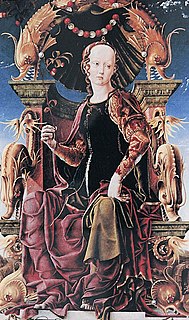 W
WCosimo Tura, also known as Il Cosmè or Cosmè Tura, was an Italian early-Renaissance painter and considered one of the founders of the School of Ferrara.
 W
WGaspare Venturini was an Italian painter.
 W
WGiacomo Vighi was an Italian painter; he was active mainly in the court of the House of Savoy as a portrait painter.